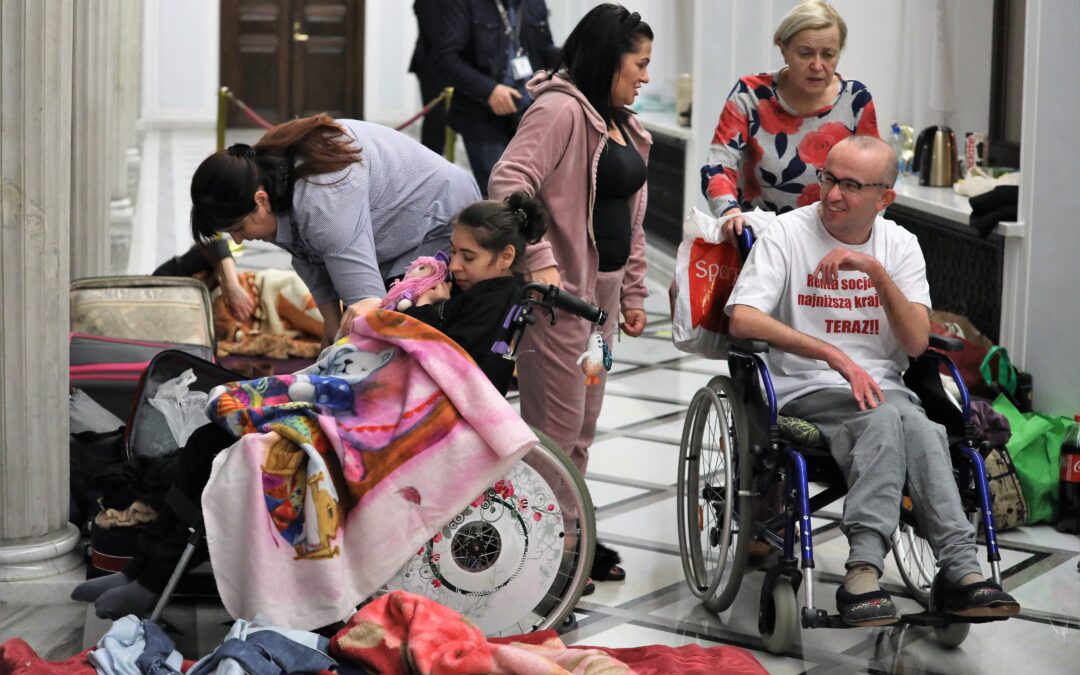A group of disabled adults and their carers have this week begun a sit-in protest in parliament to demand that their welfare allowance be raised to the level of the minimum wage. Similar protests took place in 2014 and 2018, lasting for weeks.
On Tuesday, the group also submitted a bill, supported by nearly 200,000 public signatures, that would enact the rise in their allowance that they are demanding.
The protesters have already spent two nights in the corridors of the lower house of the Polish parliament, the Sejm. At night they sleep on mattresses spread out along the walls, although have reportedly seen their sleep disrupted by hourly checks by parliamentary guards.
Opiekunowie dorosłych niepełnosprawnych wraz ze swoimi podopiecznymi wznawiają protest w Sejmie. Domagają się zrównania renty socjalnej z minimalną krajową.
Ważna sprawa, o którą trzeba walczyć.
✌️✌️#Niepelnosprawni pic.twitter.com/uFHJwlJp2W— Bogdan Klich (@BogdanKlich) March 6, 2023
“We do not yet have plans for how long we will protest in the Sejm,” one of the protest leaders, Iwona Hartwich, who as well as being the mother of a disabled son is also an opposition MP with the Civic Coalition (KO) group, told RMF FM.
“Apart from the bill, our aim is also to draw attention to the situation of our families and people with disabilities,” she added.
As of 1 March 2023, after a revaluation, adults with disabilities receive an allowance of 1,588.44 zloty (€339.06) a month before tax. That is less than half the statutory minimum wage of 3,490 zloty (€744.84).
Hartwich says that, after tax, the allowance received by disabled adults is just 1,217 zloty. Another opposition MP, Katarzyna Kotula of The Left (Lewica), notes that the recent “record inflation and the cost of living crisis,” has made it even more “difficult to survive on such a sum”.
🎥 Posłanka @iwonahartwich (@KO_Obywatelska) w #RozmowaRMF: noc w Sejmie była fatalna, Straż Marszałkowska przychodziła do nas co godzinę; przyprowadzono też psa, który szukał u nas narkotyków @RMF24pl pic.twitter.com/o5gMT7rXIp
— RozmowaRMF (@Rozmowa_RMF) March 7, 2023
The government points out that, after the previous protest in 2018, it raised the allowance to match the minimum amount paid to workers who are no longer able to work for health reasons.
Marlena Maląg, the family and social policy minister, notes that the government has also implemented a number of measures to support disabled people, including a so-called Solidarity Fund as well as expanding assisted living, respite care and residential care centres.
“These programmes did not exist at all before 2016,” she claimed, quoted by the Polish Press Agency (PAP), adding that the government was in dialogue with carers of disabled people about creating further “systemic solutions” and that a further meeting is planned for next week.
The recent ruling in Poland banning abortion in the case of serious birth defects has focused attention on how the state supports parents of disabled children.@AnnaZabl spoke with three families about the challenges they facehttps://t.co/UAH2kUx9My
— Notes from Poland 🇵🇱 (@notesfrompoland) December 2, 2020
Hartwich, however, dismissed the minister’s comments, saying that although 33 billion zloty (€7 billion) has been paid into the Solidarity Fund, only 12 billion had actually been transferred to help disabled people so far.
Her group of protesters is demanding that the Sejm begins work on their bill during the current parliamentary session. The Sejm speaker, however, says it would not be possible, pointing to the need to count and verify the supporting signatures first and to process bills that were submitted earlier.
In 2018, the protest of disabled people and their carers lasted 40 days. At that time, they made two demands: raising their benefit to match the minimum pension paid out to workers unable to work and the introduction of a rehabilitation allowance for disabled adults of 500 zloty a month.
Between March and April 2014, parents of disabled children fought for an increase in the care benefit, which then stood at 820 zloty (€174) net a month. Carers are currently also fighting for the right to take up employment without the risk of losing the benefit.
Parents and other carers of disabled people protested in front of the Presidential Palace demanding the right to work part time without losing benefits.
They say it is difficult to survive on the 2,119 zl (€450) in nursing benefits they receive per month https://t.co/SORftQUQhR
— Notes from Poland 🇵🇱 (@notesfrompoland) November 22, 2022
Main image credit: Slawomir Kaminski / Agencja Wyborcza.pl

Alicja Ptak is deputy editor-in-chief of Notes from Poland and a multimedia journalist. She has written for Clean Energy Wire and The Times, and she hosts her own podcast, The Warsaw Wire, on Poland’s economy and energy sector. She previously worked for Reuters.




















